We are now a year and a half into a pandemic that the global community has struggled to contain. Part of the problem has been widespread misunderstandings with masks.
At first, masks were viewed as necessary but scarce. As crafty individuals and, later, businesses started producing cloth masks, those took up public consciousness and have since dominated the faces of most people for a year or more.
Masks might be less common now as the vaccine rolls out, but millions still wear them. More importantly, we see them everywhere.
Except, we don’t just see them on faces. We see them on sidewalks, in yards, in trash bins. We see them in rivers, lakes, and forests. People drop masks, people lose them, and people discard them. Even taking them properly to a waste disposal still means these masks – many of which are made to be used once and discarded – are creating a burden on waste processing and the environment.
Environmental Impact
Masks bring two issues to the forefront with environmental concerns. The first is littering. Whether it’s accidental drops, intentional littering, or the wind blowing a mask away from a designated trash receptacle, masks have ended up everywhere. They’re in forests, in rivers, in urban centers, and everywhere else.

The other issue is waste disposal. As much as we might not like to admit it, our ability to process trash is still incomplete. Landfills do their best, but they’re still large mounds of trash, some of which can take centuries or millennia to degrade fully.
This isn’t a new problem, of course. Societies have been struggling with waste disposal for as long as civilizations have existed. There was a time when everything was simply burned before the environmental impact of smoke was fully understood.
Masks, specifically, were known to be an environmental hazard even when the pandemic began. This article from August last year discusses the problem.
Part of the problem is that most disposable masks are made in whole or in part out of plastics, which can take decades or centuries to break down. Even then, they degrade into microplastics, which may be the next global pollution crisis with how deeply and dangerously they affect wildlife, including our food chain.
“Over the medium to long term, animals and plants are also affected. Through its sheer mass, plastic waste can smother environments and break up ecosystems. Some animals also cannot distinguish between plastic items and their prey, subsequently choking on pieces of litter.
Even if they do not choke, animals can become malnourished as the materials fill their stomachs but provide no nutrients. Smaller animals may also become entangled in the elastic within the masks or gloves as they begin to break apart.”
With billions of masks in use every day, many of which are discarded regularly, it’s no wonder that a pollution crisis has exploded in under a year.
Balancing Safety with Environmental Protection
The biggest problem we currently face with masks is the personal choice of what kind of masks to wear. For many people, the decision comes down to how easy it is to breathe, how comfortable the mask is to wear throughout the day, and how expensive it is to replace. However, those more environmentally conscious of us need to add another concern: the impact on the environment.
Different kinds of masks have different levels of waste associated with them.
- What the mask is made out of. Disposable surgical masks are typically made of plastic materials and are terrible for the environment, whereas reusable cloth masks are made of more biodegradable fabrics and aren’t discarded after every use.
- How many times the mask can be reused. Cloth masks are designed to be washed and worn again and can be kept in use for months or years. Surgical masks are meant to be discarded after every use, and N95s without replaceable cartridges need to be replaced fairly often.
- If they have disposable parts. Cloth masks are great when they’re reusable, but if they’re using disposable filters, those filters can be a huge source of environmental contamination themselves.

And, of course, you have to contend with how you discard them. After all, medical facilities have been using surgical masks routinely for decades, but they haven’t been an environmental crisis until now. Why? For one, the sheer volume of new mask usage. For another, medical waste has its own disposal channels, and those masks are discarded through those channels, where they can be properly handled.
A newer study from July of 2021 took a closer look at the environmental impact of masks after a year of the pandemic. Per MIT:
“The COVID-19 pandemic is estimated to generate up to 7,200 tons of medical waste every day, much of which is disposable masks. And even as the pandemic slows down in some parts of the world, health care workers are expected to continue wearing masks most of the time.
That toll could be dramatically cut by adopting reusable masks, according to a new study from MIT that has calculated the financial and environmental cost of several different mask usage scenarios. Decontaminating regular N95 masks so that health care workers can wear them for more than one-day drops costs and environmental waste by at least 75 percent, compared to using a new mask for every encounter with a patient.”
The best masks for the environment are fully reusable silicone N95 masks, but those aren’t commercially available, so it’s a moot point. Once such a mask is developed, having a mask and a filter that can be sterilized and reused will be ideal. For now, it’s science fiction.
Can Masks Be Recycled?
Unfortunately, masks generally can’t be recycled. Surgical and plastic masks need to be discarded. The plastic they’re made out of isn’t reusable. Cloth masks can be disposed of in the same way as other textiles but should be cleaned first. The exact method of disposal depends on your local jurisdiction and what agencies handle waste in your area.

Perhaps in the next few years, there may be a push to recycle masks effectively, but for now, no such process exists.
What Actions Can You Take?
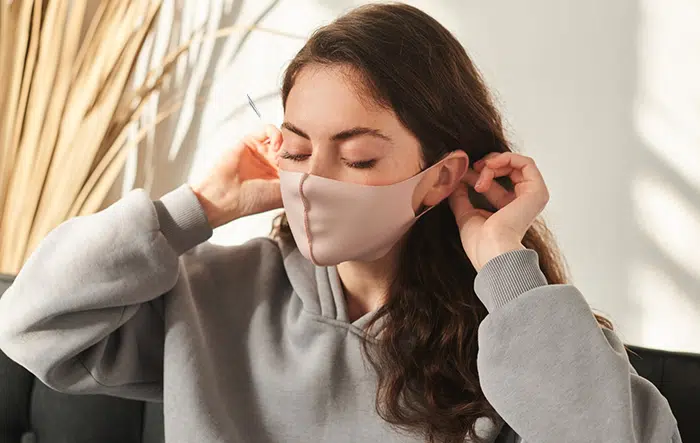
For now, we’re assuming that you’re an average person with no above-average power to influence mask usage. If you’re a congressman, CEO, or another influential individual with more power, perhaps think about the impact you have on the environment and find ways to mitigate it. On an individual level, there are some choices you can make and some things you can do to lessen your burden.
Use reusable cloth masks.
The first and the best thing you can do, at least until better technology is invented to minimize environmental impact, is to pick up a reusable cloth mask. We recommend our own masks, of course, but there are thousands of vendors selling masks if you want to pick one from a local craftsman or Etsy seller as well.

If you’re concerned about getting a mask that can protect you properly, we wrote a rundown of the different styles and kinds of fabrics a mask can be made out of and which ones are best. Check it out to help you pick the right mask.
Consider investing in eco-friendly mask makers.
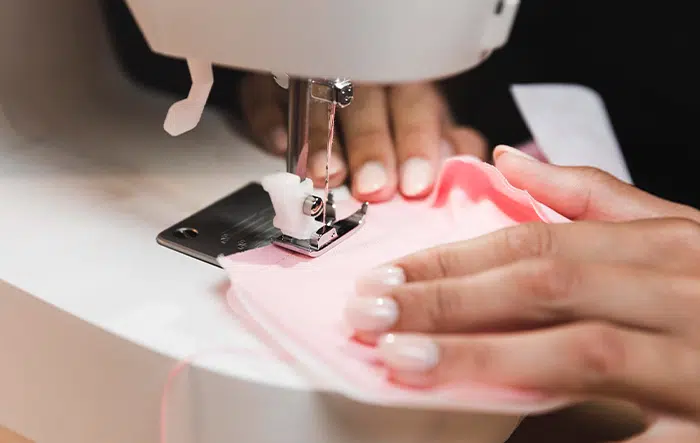
As environmental impact grows with regards to masks, more companies are starting to invest in eco-friendly ways to produce masks. There are a few companies out there now that use eco-friendly materials, manufacturing, and recycling options for their masks. You can find masks made of hemp fibers, masks made of recycled materials, and a few other variations on the theme. We don’t have any specific company recommendations here; just do your research and make sure they’re as good for the environment as they say they are.
Avoid double-masking with disposable masks.
Double-masking is a trend some people have picked up to try to give cloth masks a better level of filtration. The truth is, this isn’t hugely important for most of the population and is likely most relevant for the immunocompromised and the unvaccinated.

If you do want to double-mask, that’s fine; just use two cloth masks to do it. It’s better to wear a real N95 or a mask with a filter, but if you can’t do either and you have to spend time in close quarters with other people, that’s the way to go.
Don’t litter or drop your masks just anywhere.
This one should go without saying, but given how often we see masks on the ground everywhere, even in the middle of national forests and way out in the ocean, it needs to be said. Don’t drop your masks on the ground. Don’t drop them on the sidewalk. Don’t throw them away in a pile of leaves. Don’t throw them at a raccoon. Don’t discard them anywhere at all, except for proper trash receptacles.
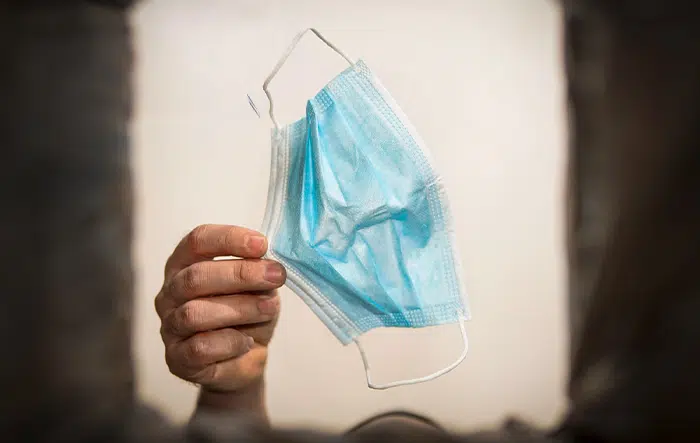
Yes, sometimes an accident happens. You have a mask balled up in your pocket, and it falls out when you pull out your phone, and you don’t notice until later. While you shouldn’t store your mask in your pocket in the first place or with other items you don’t regularly sanitize, you should also consider going back to find and retrieve it. Cloth masks can be washed and reused! A little dirt isn’t going to hurt it.
Consider a community cleanup event.
With so many discarded masks all over, it can be worthwhile to organize a community cleanup event. Whether it’s a local beach, a public park, or just your stretch of the neighborhood, clean it up. Do your part to pick up trash and debris.
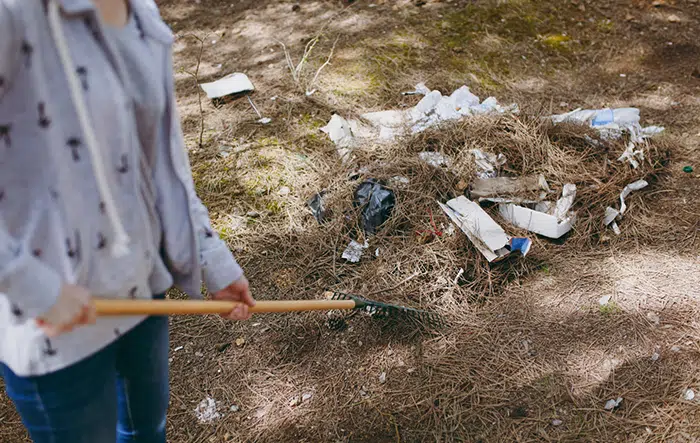
If you’re going to do this, make sure to take proper precautions. While there’s very little evidence that COVID-19 can be caught from touching a surface, it’s still better to be safe when handling hazardous waste. Use gloves, use grabbers, use a broom and a dustpan, whatever you have available. Keep yourself safe.
Lobby and organize higher-level action.
At the end of the day, individual action can only do so much. Your contribution to the protection of the environment is still relatively minor compared to that of companies with the power to make greater changes. Lobby local organizations and governments to mandate cloth masks for non-essential personnel, or to punish littering more harshly, or implement community cleanup efforts. The specific solution will vary from place to place, so we can’t offer specific instructions.

Just remember that arguing against masks in the first place is just going to put people in danger. Masks are a good thing! They just need to be treated properly, cleaned, reused, disposed of properly when the time comes, and otherwise handled appropriately. Leave the disposable masks for healthcare workers, and invest in a few reusable cloth masks for yourself. If you are in the market for a high-quality reusable face mask, we once again highly recommend checking out our line of MyAir face masks. Not only do they do their job well, but they’re also comfortable and have various styles for just about everyone.
Whatever you do, do your part to minimize the damage masks can cause to the environment. Cloth masks are your best option, at least until something better is invented, and that technology has not yet reached the point of being mass-produced. One day, perhaps, but not today.
Do you have any additional statistics regarding the environmental impact of face masks that we may not have mentioned? Do you have other actions in mind that each of us can take to reduce our environmental impact with face masks or otherwise? Be sure to leave those down in the comments section below! We’d love to hear what each of you has to say. We all share this planet together, and by working together, we can clean it up piece by piece for a healthy future!
Additionally, if you ever have any comments, questions, or concerns regarding the MyAir mask or face masks in general, feel free to reach out to us! We’d love to help you out with whatever needs you may have.



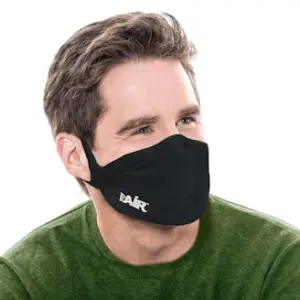







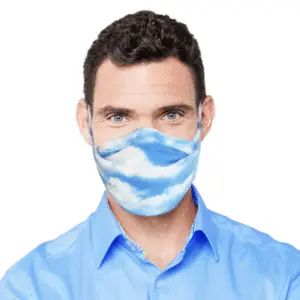

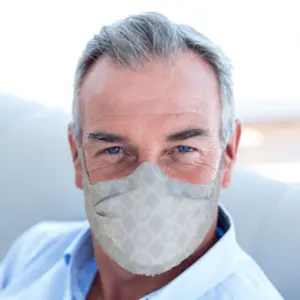

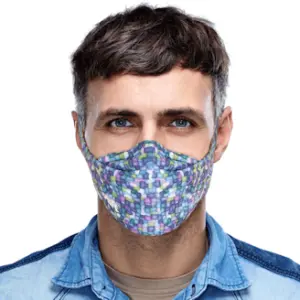




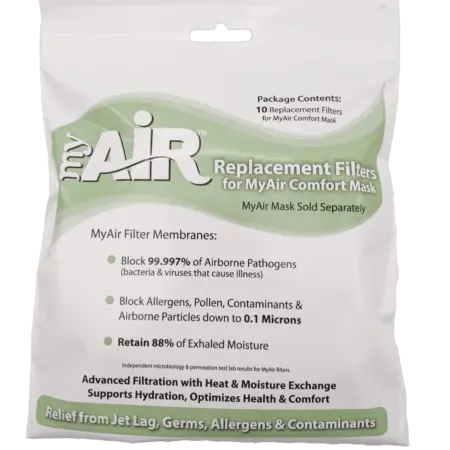
0 Comments